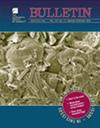New paleomagnetic and geochronologic results from late Paleozoic rocks in the Turfan-Hami block (NW China) and implications for the geodynamic evolution of the western Altaids
IF 3.9
1区 地球科学
Q1 GEOSCIENCES, MULTIDISCIPLINARY
引用次数: 0
Abstract
How and when the ocean-continent transition started in the western Altaids remain controversial. The paleomagnetic signals recorded by late Paleozoic rocks in the Turpan-Hami block can provide critical constraints on this issue. We conducted a new combined paleomagnetic and geochronologic study on the late Paleozoic rocks from the Turpan-Hami block. Laser ablation−inductively coupled plasma−mass spectrometry zircon U-Pb dating of volcanic beds from the Upper Carboniferous Qijiaojing and Julideneng Formations yielded ages of 313.1 ± 4.3 Ma and 309.6 ± 1.9 Ma to 308.1 ± 3.6 Ma, respectively. Meanwhile, the U-Pb age of the granite intruding the Julideneng Formation is 300.3 ± 2.4 Ma. Passing a series of fold tests, the characteristic remanent magnetization (ChRM) directions of the Qijiaojing Formation are likely primary and consistent with the Kiaman reversed superchron (ca. 319−267 Ma). However, the ChRM values of the Dananhu (Middle Devonian) and Julideneng Formations all represent reverse polarity with negative fold tests, which indicate remagnetizations related to the magmatic thermal events during the late Carboniferous. Thus, two high-quality paleomagnetic poles were obtained for the periods ca. 313−308 Ma at 44.4°N, 177.3°E (K = 22.1, A95 = 8.0°) and ca. 300 Ma at 47.8°N, 173.9°E (K = 116.0, A95 = 4.8°), respectively. Comparison with published coeval paleomagnetic poles of the blocks on both sides of the Tianshan sutures suggests that the central oceanic basin of the western Paleo-Asian Ocean (between the Siberian and Tarim blocks) had been closed since the late Carboniferous (ca. 310 Ma), apart from remnant seas. In addition, a sizeable clockwise rotation (∼58°) of the Turpan-Hami block had taken place during the early Permian, with a scissor-style shrinking of the remnant Bogda marine basin in the meantime. This study provides a new perspective for understanding the tectonic evolution of the western Altaids.吐鲁番-哈密地块晚古生代岩石的古地磁和年代学新结果及其对阿尔泰山西部地球动力学演化的意义
在阿尔泰山脉西部,海洋与大陆的过渡是如何以及何时开始的仍然存在争议。吐哈地块晚古生代岩石记录的古地磁信号可以为这一问题提供关键的约束。本文对吐鲁番-哈密地块晚古生代岩石进行了新的古地磁与地质年代学结合研究。激光烧蚀-电感耦合等离子体-质谱法测定上石炭统七角井组和聚力德能组火山床锆石U-Pb年龄分别为313.1±4.3 Ma和309.6±1.9 ~ 308.1±3.6 Ma。侵入Julideneng组的花岗岩U-Pb年龄为300.3±2.4 Ma。通过一系列的褶皱试验,认为七角井组的特征剩磁(ChRM)方向可能是原生的,与Kiaman逆超时(约319 ~ 267 Ma)一致。而大南湖组(中泥盆世)和Julideneng组的ChRM值均表现为反极性,褶皱试验呈负向,表明晚石炭世岩浆热事件与再磁化有关。因此,在44.4°N, 177.3°E (K = 22.1, A95 = 8.0°)和47.8°N, 173.9°E (K = 116.0, A95 = 4.8°)分别获得了约313 ~ 308 Ma和约300 Ma的高质量古磁极。与天山断裂带两侧已公布的同时期古磁极对比表明,古亚洲西部(西伯利亚和塔里木地块之间)的中央洋盆自晚石炭世(约310 Ma)以来,除残留海外,其余部分都处于封闭状态。此外,吐鲁番-哈密地块在早二叠世发生了较大的顺时针旋转(~ 58°),与此同时,残余的博格达海相盆地发生了剪刀式收缩。该研究为认识阿尔泰山脉西部构造演化提供了新的视角。
本文章由计算机程序翻译,如有差异,请以英文原文为准。
求助全文
约1分钟内获得全文
求助全文
来源期刊

Geological Society of America Bulletin
地学-地球科学综合
CiteScore
9.30
自引率
8.20%
发文量
159
审稿时长
4-8 weeks
期刊介绍:
The GSA Bulletin is the Society''s premier scholarly journal, published continuously since 1890. Its first editor was William John (WJ) McGee, who was responsible for establishing much of its original style and format. Fully refereed, each bimonthly issue includes 16-20 papers focusing on the most definitive, timely, and classic-style research in all earth-science disciplines. The Bulletin welcomes most contributions that are data-rich, mature studies of broad interest (i.e., of interest to more than one sub-discipline of earth science) and of lasting, archival quality. These include (but are not limited to) studies related to tectonics, structural geology, geochemistry, geophysics, hydrogeology, marine geology, paleoclimatology, planetary geology, quaternary geology/geomorphology, sedimentary geology, stratigraphy, and volcanology. The journal is committed to further developing both the scope of its content and its international profile so that it publishes the most current earth science research that will be of wide interest to geoscientists.
 求助内容:
求助内容: 应助结果提醒方式:
应助结果提醒方式:


